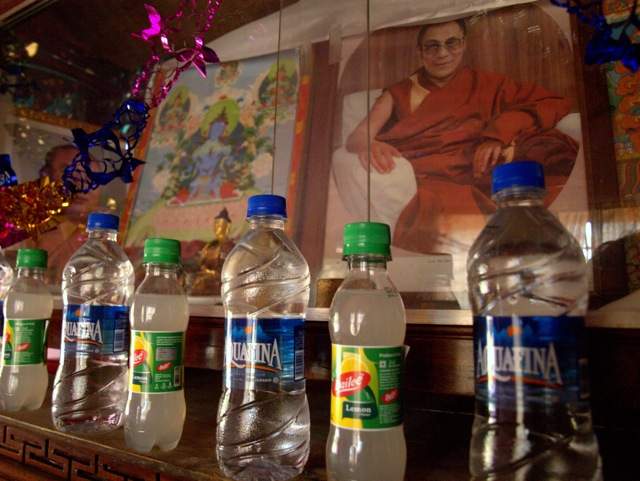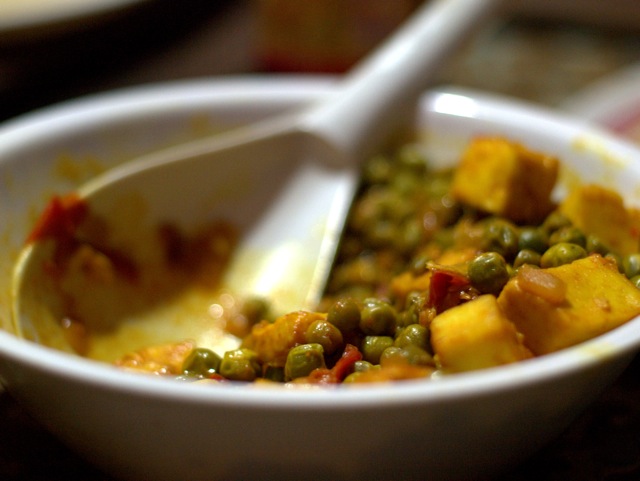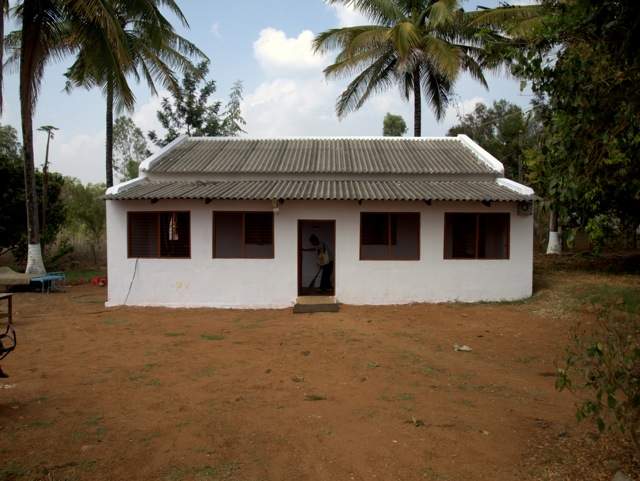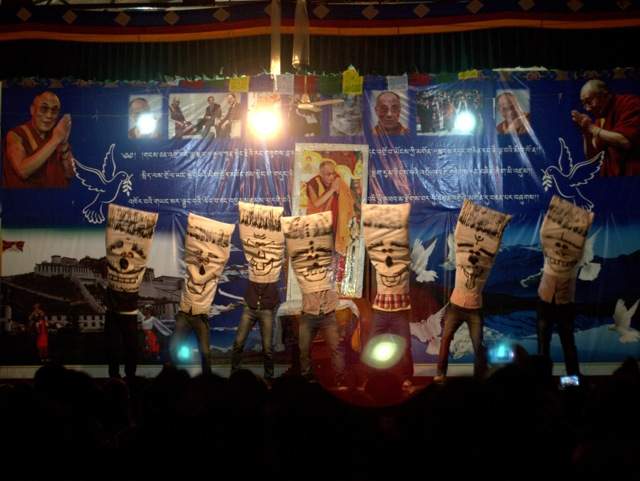Editor’s Note: “A Day in the Life” is a new series in which we chronicle a specific day in the life of a long-term traveler. If taking a big trip is something you’ve always dreamed about, experiences like these are what is possible
I am woken by music blaring from the loudspeakers that hang off the roadside grocery shop across the yard. It is 6:45am. After the 30-second musical introduction, an announcement begins:
“This is the Tibetan Language version of Radio Free Asia.”
I am in Rabgyaling, a Tibetan exile settlement in the south Indian state of Karntaka, at my fiancé’s house. Her father tunes into Radio Free Asia and has its message broadcast through loudspeakers for the entirety of the village to hear each morning at the crack of dawn.
The cement walls of this room, which I am sharing with my fiancé, Dolker, and her sister, Choeden, are painted bright pink. The floor is hard, smooth cement, and the ceiling is a steep slant of corrugated iron that has already begun to radiate the south Indian heat.
The windows are all open. The curtains stir in the mild breeze. Outside, unfamiliar birds are beginning to sing unfamiliar melodies. I lean up to look through the open widow, past the banana trees and coconut palms, at the narrow, potholed road that connects the various villages of the settlement. Monks, clad in maroon robes, are slowly making their way to the nearby gompa, carrying open books, which they are reading aloud as they walk, committing prayers to memory. Some of them stop and sit outside the shop to listen to the news, which is discussing the Dalai Lama’s recent audience with President Obama, and what it may mean for Tibetans in exile.
I tip-toe slowly into the shrine room, whose walls are lined with glass cupboards filled with thanka paintings, statues of deities, and photographs of the Dalai Lama and other important reincarnated Lamas. I spread my mat on the floor and begin my morning yoga stretches, a habit I picked up two years ago in Himachal Pradesh.

By the time I’m done the sisters are already up and in the kitchen helping their mother prepare a breakfast of spiced milk tea, channa masala, eggs and soft round Tibetan Amdo bread.
Every meal in this house is prepared by hand with raw ingredients, usually with produce grown on the family farm. Whatever isn’t eaten is put in a bucket under the sink and given to the dog at the end of the day. The women are vegetarians. Only the father eats meat, which he buys from Indians who occasionally drive through the village honking, offering freshly-slain chickens or catfish they caught that morning in a nearby lake.
Every meal in this house is prepared by hand with raw ingredients, usually with produce grown on the family farm.
Amala, “mother” in Tibetan, brings me a tea, and I sit in the dining area next to large statue of a fat laughing Buddha. I begin my morning ritual of going through my Tibetan notecards. One by one I sound the words out, occasionally calling into the kitchen to ask one of the women whether or not I’m getting the pronunciation correct.
I have been learning Tibetan for several months now. Although I’ve mastered the alphabet and have a rich vocabulary of words, I can only have basic conversations without running into difficulties. Over the past few years I’ve managed to pick up two foreign languages, but Tibetan is by far the most difficult I’ve ever encountered. To begin with, one must learn an entirely new alphabet to be able to pronounce the words correctly, and even though the alphabet is phonetic, that doesn’t mean you’ll know how to spell things just because you can sound them out, as the spelling of words is rarely phonetic.
If you want to learn to read Tibetan, which few Tibetans born in exile do, you must memorize the spelling of each and every word. Then there are the variations of the ‘Tibetan’ language itself. When most people refer to ‘Tibetan,’ they refer to a specific dialect spoken in the Central region of Tibet, called Lhasa-keh. The language spoken in the two other regions of Tibet, Kham and Amdo, is very different – somewhat similar to the differences between Spanish and Italian. On top of these differences, there is another dialect used among the exile community in India that utilizes many Hindi and English words. Then there are the differences between spoken Indian Tibetan and written Tibetan, which are almost completely different languages. And this is not to mention the tones, and the new sounds that are totally alien to native English speakers.
In short, it is no easy task. So I go through my Tibetan notecards, write ten sentences using new words I’ve learned, then sit down with the family for breakfast.

As we eat, the family talks, but I rarely understand what they are saying. From time to time Dolker tells me the theme of the conversation, and I nod. I try my best to follow the thread, understanding a clause here and there, but quickly weary and instead drift off into daydreams.
As far as I know, it is the only computer with internet access in the village and it is painstakingly slow.
After breakfast I help clear the table and wash the dishes, then head over grocery shop to use the internet. As far as I know, it is the only computer with internet access in the village and it is painstakingly slow. It takes five minutes for Windows to load, and another five minutes to load Skype.
Back in America it is my sister’s birthday today, and I want to call her to wish her a happy one. Due to the twelve-hour time difference, I can only do this early in the morning, when it is late in the evening back in my home state of Oklahoma.
When skype has finally loaded, the computer freezes. I wait five minutes for something to happen, then try rebooting it. Another 15 minutes passes before I’ve got Skype loaded again. I try calling home. On the fifth try I am successful. I hear my mother’s voice, but she can’t hear me. The computer’s microphone isn’t working. I hang up, unplug and plug it back in and try again. But it still isn’t working. I try rebooting Skype, which takes another five minutes, and try again. But still it doesn’t work.
I spend the next 45 minutes trying to figure out why the microphone, which I had used just the day before, isn’t working anymore. As I fiddle with the wires in the back of the computer I accidentally electrocute myself. So far I’ve spent over an hour trying to make a simple phone call. I try rebooting the computer. 15 minutes later I have Windows open again, and the computer seems to be recognizing the microphone, but before I can open Skype the power goes out, just like it does nearly every day between 9am and 6pm.
I have become used to such problems after almost two years in India, but I can’t help but stomp angrily back to the house. I try to hide my frustration, as the family may misinterpret it, or might mistake my anger for anger at them, or might think my anger at slow internet is simply a manifestation of something else.
I sit down for twenty minutes of Tibetan conversation with Choeden, then hop on the family’s little moped for a trip to the village hospital and police station. It’s a five minutes drive over the empty highway across a dry landscape that closely resembles the central African savannah to the hospital, where a single nurse, and no doctors, is on duty. Dolker tells me there is a doctor who works here, but says there are so few patients that he only comes during emergencies.
The hospital consists of a few open-air rooms, with various public awareness signs pasted on the walls, dealing with issues such as the health hazards of burning trash. The doorways are so low I must crouch to avoid hitting my head.
I’ve come here because a few days ago, after nearly two weeks on the road traversing the entire length of India north to south, I developed a strange cough. No fever or any other indications of illness, just a perpetual cough in which my lungs feel filled with goo. I want to see a doctor to find out whether anything abnormal is going on. Instead, I tell the nurse I have a cough and am told to go to the little pharmacy room – more of a closet, really – to buy some cough syrup.
We hop back on the scooter and putter forty-five seconds down the road to the police station, a small one-room affair on the roadside. Within, a single policeman is reading the local Kannnada-language paper. On the wall behind him are two posters displaying the parts of a rifle which the policeman below has doubtlessly never seen.
The policeman does not speak Hindi or Tibetan (which is odd given that he’s serving the Tibetan community), so we are unable to tell him that I, the foreigner, have, through a four-month bureaucratic process, obtained the “necessary” Protected Area Permit that gives me the right to remain two weeks in this Tibetan settlement, which is otherwise off-limits to non-Indians. But via a couple of slowly pronounced Hindi and Kannada phrases, and lots of pointing and gesturing, Dolker gets the point across.
The man shakes my hand, says we’re free to go, and returns to his paper.

By the time we get back to the house it is too hot for any serious activity. Dolker and her sister begin the preparations for lunch while I lie in the back room near the window, savoring each little breeze that blows over my sweat-drenched body. From the frigid altitudes of the high Himalaya, with an average elevation exceeding 4,500 metres (14,800 feet), to the malarial heart of Karnataka, the Tibetans here have made a commendable adaptation. This circulates through my mind as we eat lunch – a meal of rice, daal and curry – with our hands, the Indian way.
I recall all the refugees I’ve met in the last few years of travel – Kurds, Iranians, Palestinians, Uygurs, Libyans, Bhutanese – and wonder what it would be like to make such an unwelcome transition by necessity rather then by choice.
I recall all the refugees I’ve met in the last few years of travel – Kurds, Iranians, Palestinians, Uygurs, Libyans, Bhutanese – and wonder what it would be like to make such an unwelcome transition by necessity rather then by choice. I think, I too am a refugee, but of a very different kind – a cultural refugee, fleeing my home not under force but of my own volition, and longing not to return, but to remain away forever.
After a brief afternoon siesta, we walk to the family farm to collect vegetables for dinner. We go with baskets full of milk, juice, sugar, and other amenities to deliver to various villagers along the way, and return with baskets full of tomatoes, spinach, and bok choy.
As the day begins to cool, the monks begin to emerge – dozens of them walking back and forth up the road, in groups or alone. Some gather at the village court across the road from the shop, playing intensely competitive games of basketball in their monks’ tank tops, their robes wrapped around their waists, while others sit outside the shop drinking Coca-Cola and listening to Radio Free Asia. Dolker tells me that games like basketball and soccer have been banned for monks at some of the local monasteries because the monks take them too seriously. From time to time the monastery disciplinarian walks by, and the monks drop the basketball and pretend to be loitering. But as soon as he’s gone they return to their games.
I too am a refugee, but of a very different kind – a cultural refugee, fleeing my home not under force but of my own volition, and longing not to return, but to remain away forever.
I go outside to do some writing under a papaya tree. Above me hang five plump, fully-ripened and fragrant papayas. I watch the village go about its late afternoon business, the time when most people come to the shop for cold drinks or groceries. I don’t have long before Dolker summons me to help with dinner, which we prepare early today because there’s a dance performance in town, a show put on by Tibetan students from the university in Mysore.
We head that way on our mopeds shortly after sundown. Although on other occasions Dolker has warned me of traveling these roads after dark because of wild elephants, this evening she says nothing.
It is a short ride in the cool night air on a empty road through the dark savannah.
Outside the town hall where the performance is to be held, the road is cluttered with dozens of mopeds, the most common form of transportation in these parts. Within, at least 120 people are seated on the bare floor. “At least one from every household”, Dolker tells me. Half of them are monks.
We sit on our sandals at the back of the hall and begin drinking coconut juice. After a few minutes the stage curtains, which have countless patched holes and burn marks, begin to drift apart, but halfway opened the rope breaks, leaving the stage only partly revealed.
Humanoid shapes appear in the fabric and begin to wrestle the giant curtains to the wings. Then a little announcer sprouts up from behind the podium and begins speaking quickly, nervously, trying his best to ignore the hidden figures battling the curtains just behind him. It seems like they’re trying to get a new rope attached, or trying to retrieve the broken end of the rope that is high up, or something, because the curtain keeps clobbering and pestering the announcer, who at one point stops speaking altogether and turns to fight it off.

The first act consists of a few young women doing traditional dances in traditional dress, followed by a dance performed by men who seem to be wearing pillowcases over their heads and have faces painted on their bellies. After the latter, the men run off stage to change into jeans and sunglasses and return to do a dance that consists primarily of pointing slowly, all in unison, across the crowd and occasionally humping the air. Then the ladies appear again, only now they’re outfitted for a rap video. Some scratchy hip-hop begins bumping around in the speakers and they march around, twerking and pointing. Only one of them seems to truly have mastered the choreography, while the others imitate her uneasily with delayed, self-conscious movements. Afterwards the monks, who’ve clapped austerely yet graciously following every act until now, are silent.
I try to fall back asleep but cannot let go of the possibility that wild Asian elephants may be foraging for papaya and jackfruit just outside the window.
Back at home we eat dinner and prepare for bed. We shut off the lights, and I wedge earplugs into my ears so that I can sleep through the 6:45am Radio Free Asia wake up tomorrow morning, and close my eyes.
Moments later Dolker shakes me awake. She’s looking out the window.
“What is it?” I ask.
“Shhhh”, she says. “I think there’s elephants outside”.
I lean up and peer out into the darkness with her. We listen for a minute but hear nothing.
“There’s no elephants”, I say.
“I heard them.”
I try to fall back asleep but cannot let go of the possibility that wild Asian elephants may be foraging for papaya and jackfruit just outside the window. I roll around for awhile then get up to go to the toilet on the other side of the house, listening and watching for elephants as I tiptoe through the darkness. Suddenly I feel something shocking and cold and alive beneath my bare right foot and jump back frightened, thinking it may be a snake. I turn on my headlamp. It’s only a frog. I urinate and return to bed.
Just as I’m about to fall asleep something thunderous and heavy thwacks against the metal roof and rolls down the slant, falling to the ground in front of the window.
It’s only a coconut.
I close my eyes and slowly drift into sleep.
